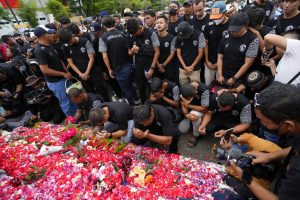The aftershocks of last weekend’s deadly stampede at a soccer match continue to reverberate in Indonesia, as the government seeks to respond to the public outcry over the tragedy.
At least 125 people were killed when panicked spectators tried to flee an overcrowded stadium in Malang, East Java. The stampede occurred when police fired tear gas to disperse fans of Arema FC, who had poured onto the pitch of Kanjuruhan Stadium after a 3-2 home defeat to its hated rival, Persebaya Surabaya.
As distraught families struggle to deal with the loss of loved ones, the government of President Joko “Jokowi” Widodo is scrambling to ensure that those responsible for the tragedy are held accountable. In the immediate aftermath of the tragedy, Jokowi ordered Indonesia’s premier soccer league suspended and instructed the authorities to re-evaluate security at soccer matches. Chief Security Minister Mahfud MD has also announced that the government would form a fact-finding team, “comprising academics, soccer experts, and other officials,” to investigate the stampede and ensure that it doesn’t happen again, Reuters reported.
The government has also moved onto the key question of accountability for the decisions of the police officers, particularly the use of tear gas, that are believed to have prompted the deadly stampede. According to The Associated Press, the Indonesian National Police yesterday removed Malang police chief Ferli Hidayat from his post, along with nine members of an elite police mobile brigade, who all face a police ethics trial that could end in dismissal. A further 18 officers responsible for firing tear gas inside the stadium are also being investigated.
These investigations have once again cast a spotlight on systemic problems in the Indonesian National Police – specifically, their tactics and training, and the impunity that they have long enjoyed.
The list of complaints against the police force, also known as Polri, is long. During protests against Jokowi’s re-election in April 2019, the police shot and killed 10 people. The same year, during nationwide student protests against a new draft criminal code in major cities across the archipelago, police fired teargas and water cannons at demonstrators and beat them with clubs. At least three protesters died and hundreds were injured in the crackdowns. No police officers were held accountable for any of these deaths.
The stampede comes at a particularly sensitive time for Polri. Just last month, the entire leadership of the internal affairs division of the National Police – the agency charged with “policing the police” – were placed under investigation for their alleged role in the cover-up of the murder of a junior policeman in July.
Brig. Yosua Hutabarat was killed in highly suspicious circumstances during a shoot-out at the Jakarta home of Inspector Gen. Ferdy Sambo, the Indonesian National Police’s head of internal affairs, a murder that was subsequently covered up. It was only after the case prompted massive public interest that an investigation was able to proceed. According to the Jakarta Post, “The cover-up held sway for several weeks before it was finally discarded, partly because President Joko ‘Jokowi’ Widodo heeded public pressure and instructed the police to be fully transparent with this case.”
Experts say that the behavior of police prior to the stampede in Malang reflects a toxic combination of poor training and impunity. “To me, this is absolutely a function of the failure of police reform in Indonesia,” said Jacqui Baker, a political economist at Murdoch University in Perth told The New York Times. She added that there was “zero political interest in really bringing about a professional police force.”
The current problem has its roots in the maelstrom surrounding the collapse of Suharto’s New Order regime in 1998. As the military withdrew from Indonesian politics in the subsequent years, Polri at least partially filled the vacuum, assuming the responsibility for internal security once exercised by the army. This responsibility brought considerable power – and considerable scope for corruption.
Despite efforts at reform, the International Crisis Group (ICG) noted in 2012 that there had been around 40 attacks on police stations and personnel since August 2010, which it took as a sign of growing public hostility toward the police. “Police are supposed to be helping prevent conflict but too often they are contributing to its outbreak,” the ICG wrote. The following year, the organization argued that Indonesia “urgently needs a competent civilian body that can police the police and show that there are tangible consequences to refusal to enforce the law or in some cases, actively violate it.”
The police have gained special prominence since Jokowi took office in 2014. As Made Supriatma of Singapore’s ISEAS-Yusof Ishak Institute noted in 2020, the Indonesian leader “has been building a uniquely close relationship with the police because he lacks strong ties with the military.” Jokowi’s embrace has strengthened the position of the police, leading it to attain something of the “dual function” (dwifungsi) that the army once enjoyed under the Suharto regime. “The police now act as both a security and political force, actively building legal cases against government opponents, silencing critics, and persecuting those who threaten the president’s power,” Made argued.
The horrific events in Malang have created a window in which the question of police accountability will be discussed openly in Indonesia. As with the mysterious killing of Brig. Yosua Hutabarat, the police involvement in the stampede is in many ways too big to cover up. The government’s investigation into this week’s soccer stampede could well identify how and where things went wrong at the stadium in Malang, and punish those responsible. But more thoroughgoing reform of the National Police is another question entirely.

































